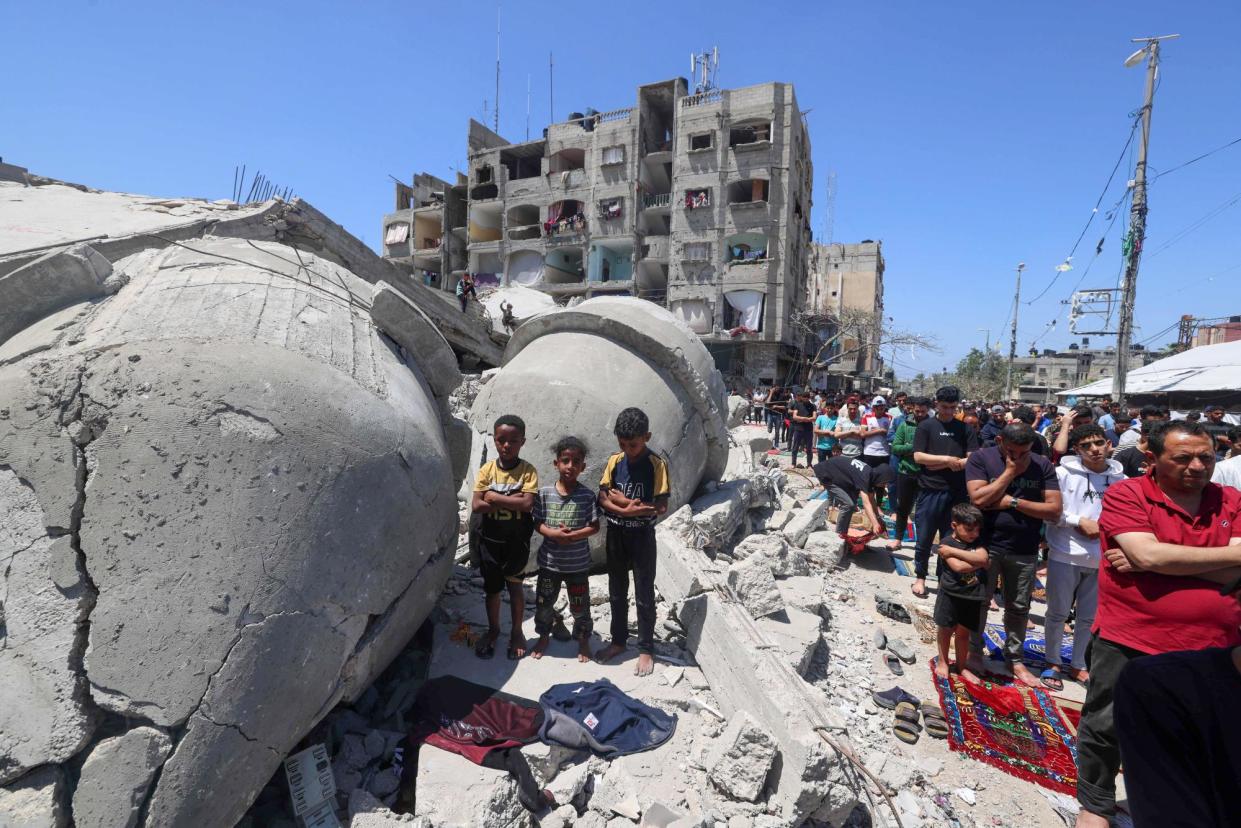G7 opposes full-scale military operation in Rafah amid fears for civilians

Foreign ministers from the G7 countries have said they remain opposed to a full-scale military operation in Rafah by Israel on the grounds that it would have catastrophic consequences on the civilian population there.
Ministers from Italy, the UK, US, France, Germany, Japan and Canada also criticised the “unacceptable” number of civilians killed in Gaza during Israel’s military offensive.
The Israeli prime minister, Benjamin Netanyahu, told western diplomats this week that he intended to push ahead with a ground assault on Rafah, the southernmost city in Gaza, where more than 1 million people are sheltering.
The G7 ministers said: “We reiterate our opposition to a full-scale military operation in Rafah that would have catastrophic consequences on the civilian population.”
Israel has faced growing global opposition to the relentless war that has reduced much of Gaza to rubble, while its 2.3 million people have suffered under an Israeli siege. “We deplore all losses of civilian lives,” G7 ministers said at a meeting on the Italian island of Capri.
At the UN on Thursday, the secretary general, António Guterres, told the security council that only limited progress had been made in getting aid into Gaza and that six and a half months of war had created “a humanitarian hellscape”.
Data from the UN shows that fewer than half of the required 500 trucks of aid a day are reaching Gaza. Aid groups have blamed Israeli restrictions for the tailback of trucks.
Guterres said: “Apparent progress in one area is often cancelled out by delays and restrictions elsewhere. To avert imminent famine and further preventable deaths from disease, we need a quantum leap in humanitarian aid to Palestinians in Gaza.”
This week a group of international activists said they planned to sail from Turkey to Gaza in the coming days on a flotilla of three ships carrying aid, advocates and journalists in a reprisal of an effort from 2010 that resulted in the death of nine activists and upended Turkish relations with Israel.
They intend to deliver aid including ambulances, anaesthesia and other items prevented from entering by enhanced restrictions on top of the 16-year Israeli blockade of Gaza..
One of the activists involved in the effort, Huwaida Arraf, said the group members planned to protect themselves by broadcasting their whereabouts during the journey and training in non-violent methods of self-defence in case Israeli forces boarded the boats, as occurred in 2010.
“It’s about challenging the policies that mean Israel controls Gaza … we can’t just stand by and do nothing while Israel starves Palestinians,” Arraf said.
The group members have refused cooperation with the Israeli authorities about their efforts to dock off the coast of Gaza, but Arraf said they had “put Israel on notice” by making their plans to sail there public.
Participants in the flotilla include international civil society groups as well as Turkey’s Humanitarian Relief Foundation (İHH), whose head, Bülent Yıldırım, said the organisation bought the ships as there was “no choice” but to attempt another flotilla to Gaza.
IHH previously organised several other ships of aid that sailed to al-Arish port in northern Sinai and trucked the items into Gaza through the Rafah crossing.
Yıldırım and members of İHH were onboard a similar flotilla in 2010 that included the MV Mavi Marmara, which was boarded by Israeli commandos in international waters as it attempted to reach Gaza. Nine activists died in the raid, most of them Turkish. Three years later, Netanyahu bowed to American pressure and apologised to the Turkish leader, Recep Tayyip Erdoğan.
Israel’s violent response to the 2010 flotilla received widespread international condemnation, and led to the breakdown in diplomatic relations with Turkey.
After Netanyahu’s apology, relations had warmed considerably in recent years. High-level diplomatic ties have been restored and trade between the two countries has increased. Two years ago, Turkish intelligence aided Israel’s spy agency the Mossad in foiling what officials said was an Iranian plot to kidnap Israeli tourists in Istanbul.
Relations rapidly deteriorated again over the Israeli response to the Hamas attacks on Israel on 7 October, in which 1,200 Israelis were killed and about 250 taken hostage.
Erdoğan has frequently employed fiery rhetoric in condemning Israel’s latest war in Gaza, where at least 34,000 Palestinians have died since October.
Turkey recently announced export restrictions on the sale of 54 products to Israel until a ceasefire is declared, and Turkey’s national carrier has paused direct flights until 2025.
Activists onboard the flotilla were reluctant to say where they intended to dock if they reached the territory, or how they might protect themselves while distributing aid. A recent Israeli attack on a convoy from the relief charity World Central Kitchen killed seven humanitarian workers.
The UN and aid groups working in Gaza have criticised Washington’s efforts to build a floating dock off the coast.
Relief groups and the UN say aid arriving overland has long proved to be the most effective at reaching those in need, while airdrops have proved deadly to those on the ground.
Arraf called the aid drops and floating pier “publicity stunts”. “We are doing what our governments should be doing, which is challenging Israel’s conduct and policies,” she said.


